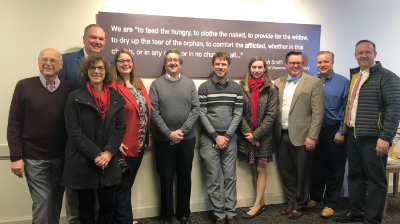
For Rabbi Mark Diamond, joining the LMU Jewish Studies community was a clear continuation in his long career as a rabbi and teacher. “The word Rabbi in Hebrew, Rav, means ‘teacher,’” Rabbi Diamond says, “And I’ve always felt that teaching is the most important aspect of what I do, or, for that matter, what any rabbi does”.
Before joining the LMU Jewish Studies department, Rabbi Diamond worked in synagogues across many different cities and served as the Executive Vice President of the Board of Rabbis of Southern California for twelve years. Rabbi Diamond has also been an educator of graduate students for more than thirteen years at the Academy for Jewish Religion, which is now housed permanently on the LMU Campus.
Rabbi Diamond loves being a part of the LMU Jewish Studies community because it means he can bring his love for teaching to an undergraduate arena. He was also attracted to the idea of a Jewish Studies program being present at a Jesuit university. “I’ve always had a really profound respect for Catholics in general, and Jesuits in particular in my career. Just like we have Islamic studies and we have professors in a variety of religious traditions, I think the Jewish Studies Program is really such a highlight of what we do at LMU.”
During his time at LMU, Rabbi Diamond and program director Dr. Holli Levitsky have collaborated frequently on one of their shared long-term interests: interfaith relations. Now in 2021, and Rabbi Diamond is in his 13th semester of teaching a course entitled Interreligious Experience and Engagement, in which he and his students discuss the “nexus between” the three Abrahamic faiths. In a pre-Covid year, Rabbi Diamond would take his students out of the classroom to a synagogue, church, and mosque, facilitating an immersive experience for his students. Students from all different faiths and majors join this course, which has recently been cross-listed by Theological Studies and Catholic Studies. “It’s just a great place to explore one’s own spirituality,” Rabbi Diamond says.
Rabbi Mark Diamond’s passion for interfaith relations is perhaps also present in his work outside the classroom with the Church of Latter-Day Saints. Working with professors Shon Hopkin and Andrew Reed from BYU, Rabbi Diamond has engaged in more than 10 dialogues with Jewish and Latter-Day Saint community members. “Nothing in my career, in terms of interfaith relations, has brought me more personal joy, satisfaction, meaning.” Rabbi Diamond says, “We’re really paving the ground.”
Meeting across the world –– including in Salt Lake City and in Israel –– Rabbi Diamond has taken part in discussions about topics that are both easy and challenging to discuss such as supersessionism, theological issues, ritual issues, and practical differences/similarities between both religions. “There’s a lot we have in common,” he said, citing the Jewish and Latter-Day Saint commitments to Tikkun Olam in the Jewish tradition and Missionary Work in the Latter-Day Saints faith, as well as both religions’ reverence for education. “And we have our differences too. After 10 of these conferences we’ve talked about both and continue to do so.”
Rabbi Diamond also takes part in interfaith dialogues twice a year within the LMU community, put on by the Center for Religion and Spirituality, along with professors such as Dr. Amir Hussain and Dr. Kim Harris. “It’s a great LMU program,” Rabbi Diamond says, “and again highlights LMU’s commitment to interfaith dialogue.”
To learn more about Rabbi Diamond’s achievements, visit his faculty profile here. You can also read more about this interfaith discourse in his most recent publication Understanding Covenants and Communities: Jews and Latter-day Saints in Dialogue where he served as co-editor.